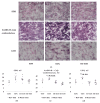Modulation of the Cardiovascular Risk in Type 1 Diabetic Rats by Endurance Training in Combination with the Prebiotic Xylooligosaccharide
- PMID: 39337515
- PMCID: PMC11432573
- DOI: 10.3390/ijms251810027
Modulation of the Cardiovascular Risk in Type 1 Diabetic Rats by Endurance Training in Combination with the Prebiotic Xylooligosaccharide
Abstract
Diabetic cardiomyopathy is a major etiological factor in heart failure in diabetic patients, characterized by mitochondrial oxidative metabolism dysfunction, myocardial fibrosis, and marked glycogen elevation. The aim of the present study is to evaluate the effect of endurance training and prebiotic xylooligosaccharide (XOS) on the activity of key oxidative enzymes, myocardial collagen, and glycogen distribution as well as some serum biochemical risk markers in streptozotocin-induced type 1 diabetic rats. Male Wistar rats (n = 36) were divided into four diabetic groups (n = 9): sedentary diabetic rats on a normal diet (SDN), trained diabetic rats on a normal diet (TDN), trained diabetic rats on a normal diet with an XOS supplement (TD-XOS), and sedentary diabetic rats with an XOS supplement (SD-XOS). The results show that aerobic training managed to increase the enzyme activity of respiratory Complex I and II and the lactate dehydrogenase in the cardiomyocytes of the diabetic rats. Furthermore, the combination of exercise and XOS significantly decreased the collagen and glycogen content. No significant effects on blood pressure, heart rate or markers of inflammation were detected. These results demonstrate the beneficial effects of exercise, alone or in combination with XOS, on the cardiac mitochondrial enzymology and histopathology of diabetic rats.
Keywords: diabetic cardiomyopathy; endurance training; glycogen content; mitochondrial function; myocardial fibrosis; type 1 diabetes; xylooligosaccharides.
Conflict of interest statement
The authors declare no conflicts of interest.
Figures




Similar articles
-
Xylooligosaccharides and aerobic training regulate metabolism and behavior in rats with streptozotocin-induced type 1 diabetes.Open Med (Wars). 2022 Oct 18;17(1):1632-1644. doi: 10.1515/med-2022-0579. eCollection 2022. Open Med (Wars). 2022. PMID: 36329786 Free PMC article.
-
Prebiotic prevents impaired kidney and renal Oat3 functions in obese rats.J Endocrinol. 2018 Apr;237(1):29-42. doi: 10.1530/JOE-17-0471. J Endocrinol. 2018. PMID: 29483238
-
Prebiotic Xylo-Oligosaccharides Ameliorate High-Fat-Diet-Induced Hepatic Steatosis in Rats.Nutrients. 2020 Oct 22;12(11):3225. doi: 10.3390/nu12113225. Nutrients. 2020. PMID: 33105554 Free PMC article.
-
Are phenolic compounds produced during the enzymatic production of prebiotic xylooligosaccharides (XOS) beneficial: a review.J Asian Nat Prod Res. 2024 Aug;26(8):867-882. doi: 10.1080/10286020.2024.2328723. Epub 2024 Apr 9. J Asian Nat Prod Res. 2024. PMID: 38594834 Review.
-
Can We Prevent Mitochondrial Dysfunction and Diabetic Cardiomyopathy in Type 1 Diabetes Mellitus? Pathophysiology and Treatment Options.Int J Mol Sci. 2020 Apr 19;21(8):2852. doi: 10.3390/ijms21082852. Int J Mol Sci. 2020. PMID: 32325880 Free PMC article. Review.
Cited by
-
Exercise and dietary interventions in the management of diabetic cardiomyopathy: mechanisms and implications.Cardiovasc Diabetol. 2025 Apr 9;24(1):159. doi: 10.1186/s12933-025-02702-y. Cardiovasc Diabetol. 2025. PMID: 40205621 Free PMC article. Review.
References
-
- de Sales Guilarducci J., Marcelino B.A.R., Konig I.F.M., Orlando T.M., Varaschin M.S., Pereira L.J. Therapeutic effects of different doses of prebiotic (isolated from Saccharomyces cerevisiae) in comparison to n-3 supplement on glycemic control, lipid profiles and immunological response in diabetic rats. Diabetol. Metab. Syndr. 2020;12:69. doi: 10.1186/s13098-020-00576-6. - DOI - PMC - PubMed
-
- Dabkowski E.R., Williamson C.L., Bukowski V.C., Chapman R.S., Leonard S.S., Peer C.J., Callery P.S., Hollander J.M. Diabetic cardiomyopathy-associated dysfunction in spatially distinct mitochondrial subpopulations. Am. J. Physiology. Heart Circ. Physiol. 2009;296:359–369. doi: 10.1152/ajpheart.00467.2008. - DOI - PMC - PubMed
MeSH terms
Substances
Grants and funding
LinkOut - more resources
Full Text Sources
Medical

